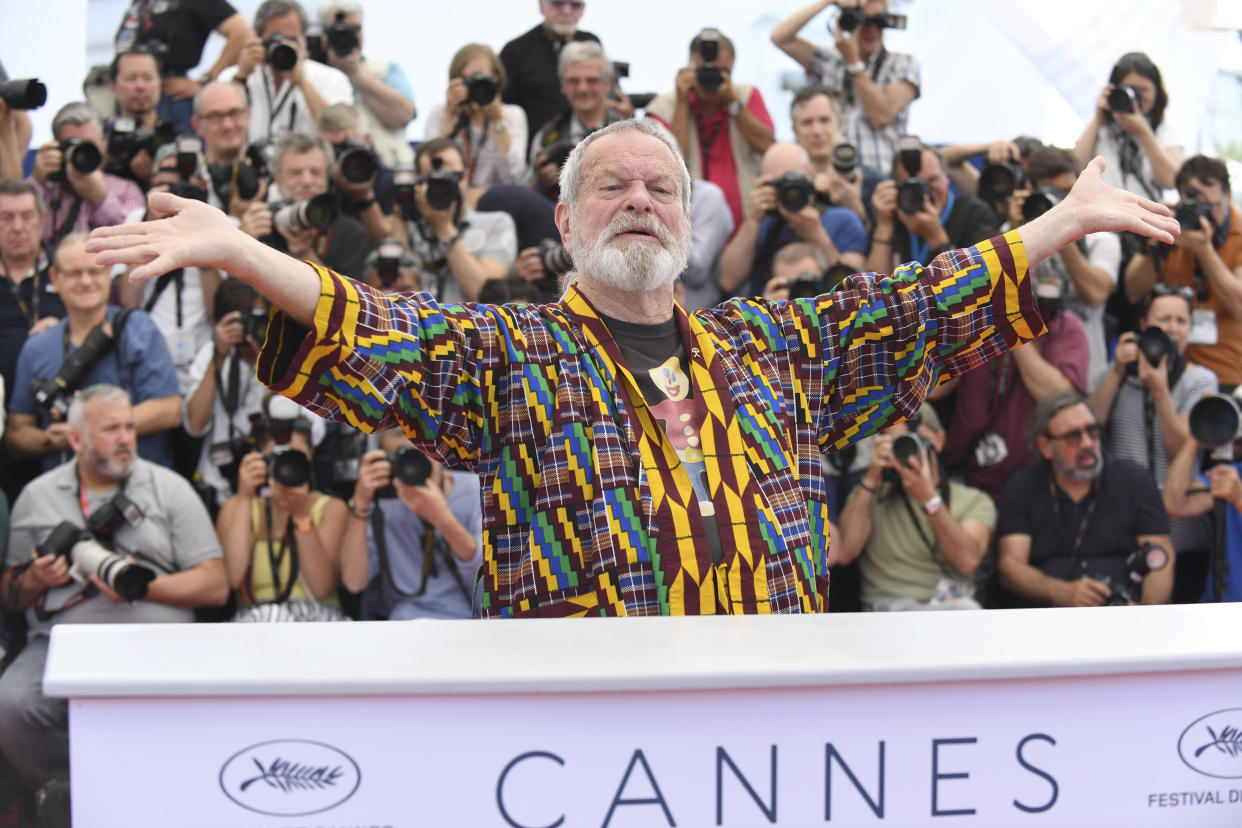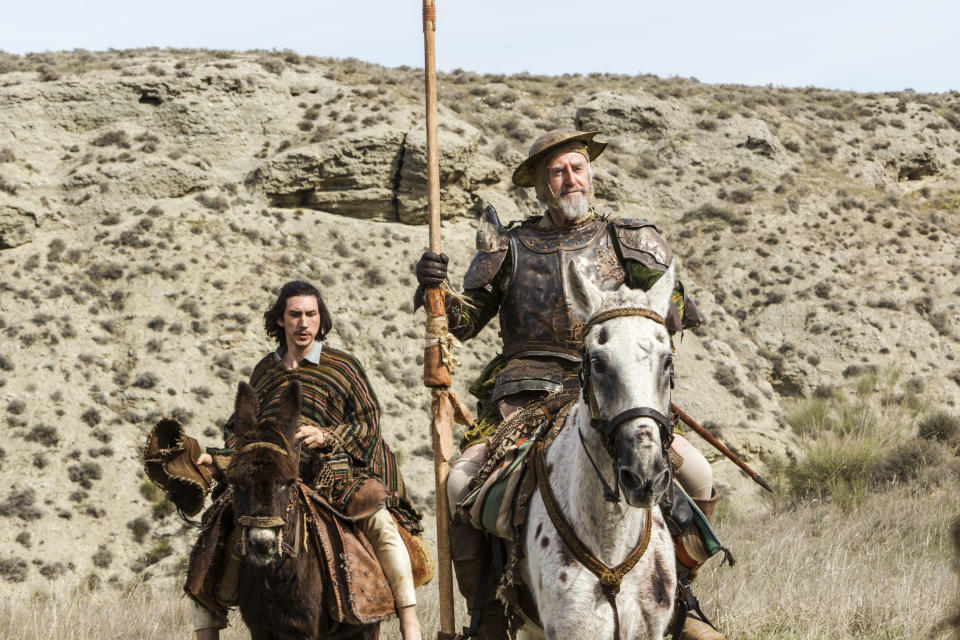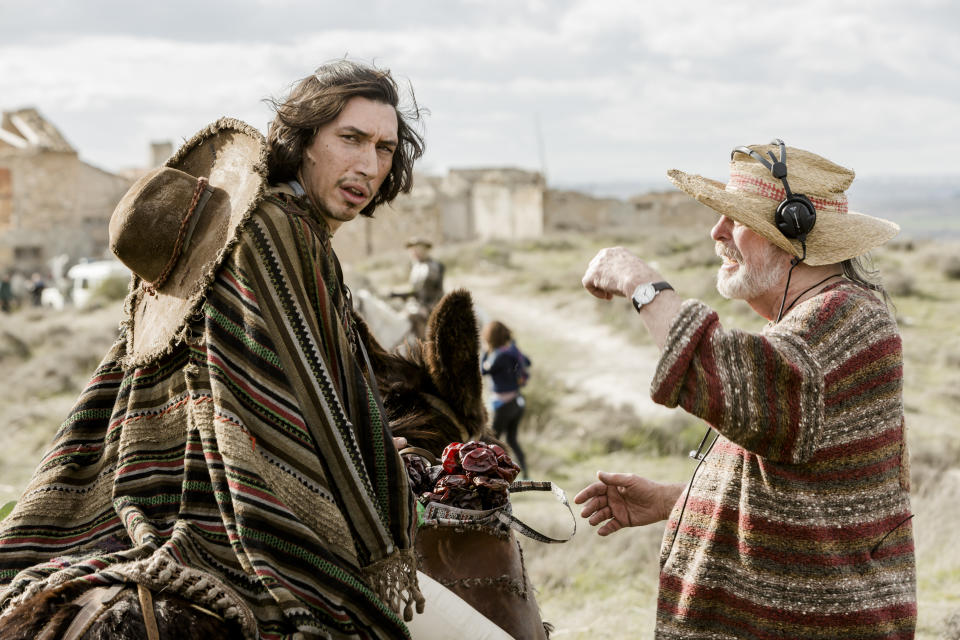Terry Gilliam on making 'Don Quixote,' defending Johnny Depp and making fun of Donald Trump

There’s an abundance of 1989 pop culture anniversaries to celebrate in 2019, from Tim Burton’s Batman to the very first episode of The Simpsons. But here’s another anniversary worth celebrating: Three decades ago, Monty Python’s ace animator, Terry Gilliam, had the bright idea of turning Miguel de Cervantes’s seminal 17th century novel into a feature film, one that would blend his own present and Quixote’s past. But that stroke of inspiration became a curse as the iconoclastic director struggled for the next 30 years to bring The Man Who Killed Don Quixote to the screen.
Over and over again, Gilliam would secure a cast and, more importantly, funding only to have the entire enterprise collapse. One of those failed attempts — which starred Jean Rochefort as Quixote and Johnny Depp as Toby, a modern-day version of the Don’s sidekick, Sancho Panza — was immortalized in the 2002 documentary, Lost in La Mancha. For years, that film was the only place to see footage of Gilliam’s passion project.

That is, until now. Against the odds, Gilliam has completed The Man Who Killed Don Quixote, with Jonathan Pryce and Adam Driver taking over the roles previously occupied by Rochefort and Depp. After premiering at the Cannes Film Festival last year, American audiences will have the chance to see it courtesy of a one-night only Fathom Events screening on April 10. (The movie opens in limited release the following week.) Yahoo Entertainment spoke with Gilliam about whether Quixote would have died with him had this version collapsed, as well as being taken to task on social media for defending Depp in the middle of his divorce from Amber Heard and how the Pythons might have solved the problem of making fun of Donald Trump.
Yahoo Entertainment: The Adventures of Baron Munchausen is the film of yours I watched the most growing up, and The Man Who Killed Don Quixote feels like the spiritual heir to that movie, specifically in the way it depicts an old man who is forgotten by time, but recaptures a sense of himself by embarking on a fantastical journey.
Terry Gilliam: The only real connection, to be honest, is the nose. [Laughs] I wasn’t really thinking of Munchausen at all. In fact, somebody pointed out that it’s closer to The Fisher King, which I hadn’t thought about. I’m really dumb — I don’t watch my own movies!
You may not revisit your own work, but I wonder if Jonathan Pryce discussed the connection between this film and Brazil. I was struck by the way that movie ends with him escaping reality into his own fantasies, and this movie begins with him already inhabiting a fantasy world.
No, Jonathan just came in and we started doing it. We didn’t spend any time considering a connection; it was a chance for him to show off. In fact, as written, the script ends with Toby and Angelica heading off into the future. But in rehearsal, Jonathan had to squeeze himself back into the end of the movie, with his voice coming in and taking over. It wasn’t anything poetic — he was just showing off! And it was brilliant, so that’s what we ended up doing.
He obviously would have known that his predecessors as Quixote — Jean Rochefort and John Hurt — have passed away. Did he seem worried that the role was cursed?
He was grateful they all died! He’s a man of patience, and [when] they all fell over dead, he thought, “OK, it’s my turn.” [Laughs] I’ll get into big trouble for that. To be quite honest, at the beginning he was concerned because he had had an operation on his knee, and had also damaged his ankle on the other leg. So we were always very careful to make sure that he didn’t injure himself anymore. But once the spirit took him, he was off and running. When he’s been in some of my other films like The Brothers Grimm, he’s a secondary character always trying to burst out and sometimes I can’t hold him back enough. With this one, he was like, “I’ll just explode.” And he does! Jean Rochefort’s costume luckily fit Jonathan, so that’s Jean’s costume he’s wearing.
So he’s literally wearing a dead man’s clothes! I’m glad he wasn’t affected by that.
No, no, no. He just knew his moment had come.
Johnny Depp originally played Adam Driver’s part, and I found myself frequently thinking about the kind of performance he would have given because Fear and Loathing in Las Vegas shows that he gets your wavelength in a very real way. Did you reframe the role at all for Driver?
When I first met Adam, he was so unlike what I was thinking, and that's why I hired him. I had reached the point of having thought this film through my head so much, that when I met somebody who was very different on every level, it just intrigued me. I said, “This is going to be more fun because it won’t have anything to do with what Johnny would have done. It’s a completely fresh approach.” And that was necessary to me to keep this thing going. With Johnny, what you see in the documentary [Lost in La Mancha] is all we got. It was just the moments where the character was in extreme situations, trapped in a world he knew nothing about and was fairly frenzied. And we don’t have those scenes in the film anymore, so there’s no moment where Adam has to be like that. He found a way of being kind of lost in this situation. It’s a much more controlled performance than Johnny would have done, put it that way.

Would you work with Depp again in the future? It’s a complicated question now because of his personal travails.
I paid great attention when Johnny was being accused of domestic violence. I actually put something out saying, “Don’t believe it, not true.” I questioned the bruise that moved around the face. And I got a lot of s**t for that. Things like, “[You] have no idea what he would be like under alcohol or drugs!” I know the guy really well, and even the evidence that was purported to show how dangerous he was just showed how dangerous to kitchen cabinets he is, not to human beings. I think Johnny can get rather stupid about his reactions to the accusations. I think at the moment it’s a little bit extreme, but he’s a good guy and he’s my friend.
You also came under criticism for comments you made about the BBC’s push for diversity. Is that something new for you, being at the center of online conversations like that?
I just find we've always been about trying to expand people's view of the world, and at the moment everything's closing in. I feel that you can't speak openly or honestly — you have to tread very carefully. At a certain point, you're not dealing with discussion anymore, you're dealing with knee-jerk reactions, and I hate that. I make noise to cause myself trouble. Life of Brian is about to come out again, and it couldn't be more appropriate for the time we're living in. People have always asked, could we do what we did then now? Probably not because there is such fear of causing offense in any form to anybody or any creature or any cardboard box that exists on the planet. The people in power are frightened to allow what Monty Python was about to happen again. I think these are sad times. If humor starts becoming limited, we're in trouble. Unless you can keep laughing at the absurdity of the human race, you're missing the point of our existence. We're an absolutely absurd species. I just put my foot in my mouth occasionally by mistake, and then I have to deal with the consequences. That's all it's about.
Quixote has already consumed so much of your life — had you never gotten to make it, would you have handed it down to someone else to make, or would it have died with you?
I don’t know. My daughter, who is planning my future, might have sold it to somebody if it was part of a collection. I suppose that I wouldn’t have done a Stanley Kubrick. You know, Steven Spielberg made A.I. and I found out much later that Kurbick was going to offer me a Dr. Strangelove sequel! I never knew that, but it’s apparently true.
Did you ever meet Kubrick?
I knew him to the extent of a few telephone calls. After I made Jabberwocky [in 1977], he called me and really wanted me to help him find an art director for The Shining. I called everybody I knew, and nobody wanted to work with him! Some of them had worked with him before and vowed, “Never again.” After a couple of months, I wrote him a note saying, “Sorry, I failed but it’d be great to have lunch someday.” I never heard back. The other story I have is that after the second Python series, my wife and I came back from vacation, and there was a letter for me from Stanley saying he wanted me to do the title sequence for A Clockwork Orange. But he wanted it done five days after I got back! We’d been away too long, and the letter had just been sitting there. So that didn’t happen either. I got close, but not close enough. But Kubrick was one of my great idols. Paths of Glory changed my life as far as my feelings towards cinema; when I saw it, I realized cinema could talk about serious things and not just comedy. It was a big moment.
Speaking of unfinished work, where do you stand on the theory that he never completed Eyes Wide Shut?
The story I was told is that he got a call from Tom [Cruise], Nicole [Kidman] and two Warner Bros. executives who had seen the film and called him to say that it’s a masterpiece, a work of genius. He went to bed relaxed and died that night. This is from somebody very close [to him]. I can imagine that: We all want to make great work, so when you actually achieve that, what do you do? I've tried to avoid that with Quixote; I read a couple reviews [saying] it's clearly not a masterpiece, so I'm still alive. I have to thank The Hollywood Reporter in particular. [Laughs]
There’s already been a 12 Monkeys TV series and Time Bandits is coming to television as well, adapted by Taika Waititi. Is it strange to see your past work translated by someone else?
Good people are involved with Time Bandits, and I’m supposed to be the godfather, I think. I’m not sure what I’m supposed to do exactly. Let’s see what happens. I just hope I have enough clout to keep it in the arena I think it should be in. I’ve met Taika Waititi, so once they get me to sign my contract, we’ll hang out. With some of my [past films] I was just a hired director. But with those I’ve got more clout on like Time Bandits I can try to keep true to the original or at least true to the spirit of the original. Make something better maybe!
As you mentioned, the 40th anniversary of Monty Python’s Life of Brian is coming up this August. The signature Terry Gilliam moment in that movie is the deus ex machina sequence where Brian is rescued by aliens. What do you remember about making that scene?
Well, we didn't know what to do with Brian. He got himself to the top of the tower and we had to rescue him somehow, so I said, "OK, spaceship for that." That was purely it. It was funny, because this was at the time when Star Wars had just come out. I remember meeting George Lucas at the baggage roundabout in the San Francisco airport, and I said, “This was my chance to do a mini Star Wars episode.”
It was just fun to do, and I wasn’t bothered by the other Pythons. We just needed Graham to look lost, and that was it. Things like that are just good fun, and the fact that we could incorporate something that ridiculous is what was good about Python. I don’t see that kind of thinking going on these days. There were no sacred cows that we could take on. And there were only three channels in England at the time, so we had a captive audience. Now, everything is so diffused. I don’t know how it works anymore, because there are so many choices. I worry that civilization doesn’t exist anymore, really. Back then, you had three choices on any one night and the next day at work, everyone’s talking about it. It didn’t matter if you liked it or disliked it. Its was something to talk about — to argue about. I don’t know how that works now. Streaming is so amorphous; it just can vanish. And there are more and more companies. I feel like we’re being divided and conquered, and you need a nice demagogue to come along. You’re very lucky to have one!
I have to ask: What would the Pythons have made of Donald Trump?
I think it would be very hard to make something even funnier — that's the real problem. It’s almost like satire is dead. Alec Baldwin goes on Saturday Night Live and does an imitation, [but] it’s not that funny. The real thing is almost funnier. So, it's a hard one. I don't know.
Check Fandango for showtime and ticket information for The Man Who Killed Don Quixote.
Read more from Yahoo Entertainment:
New 'Pokémon: Detective Pikachu' video introduces Jigglypuff, Charizard, Pancham, Eevee and more
New 'Lion King' trailer introduces leaner, meaner Scar — plus singing Timon and Pumbaa
Want daily pop culture news delivered to your inbox? Sign up here for Yahoo Entertainment & Lifestyle’s newsletter.

